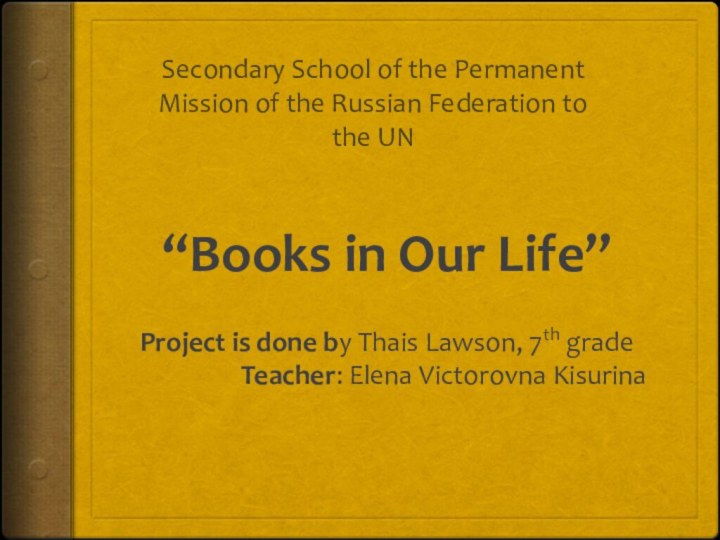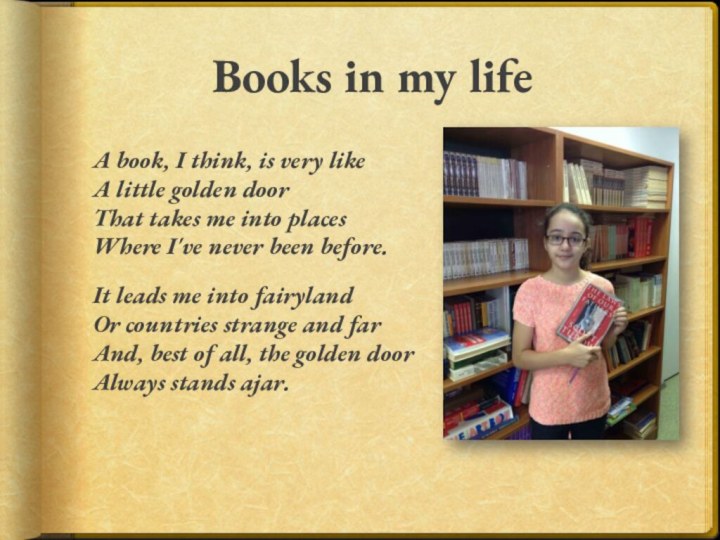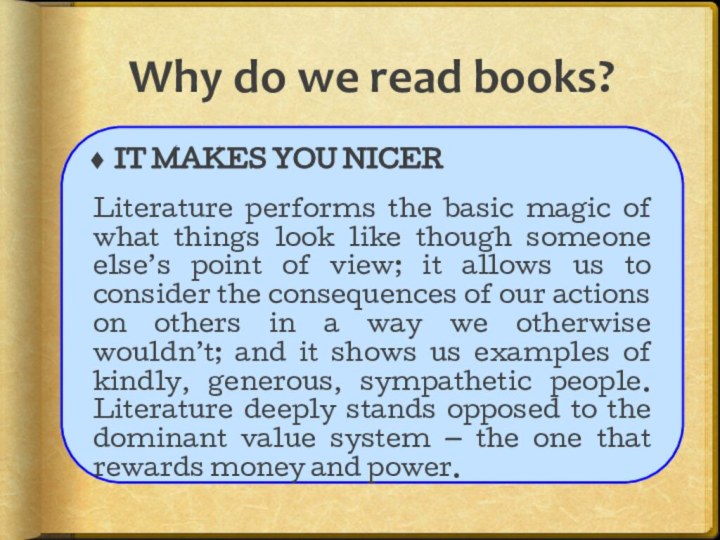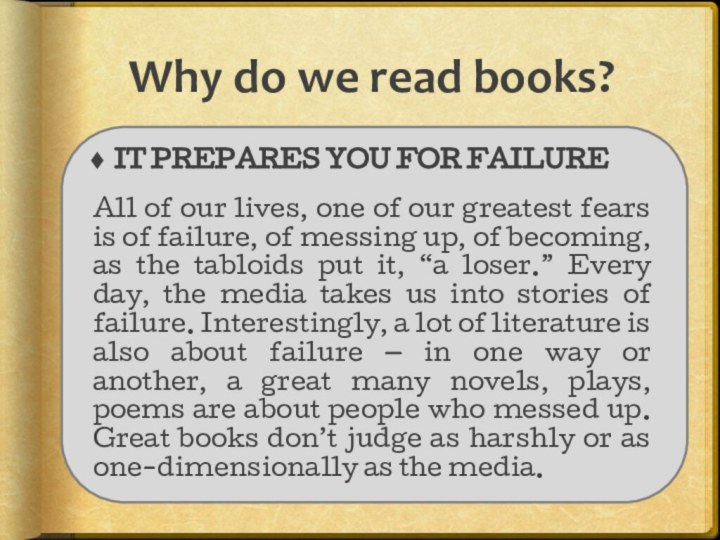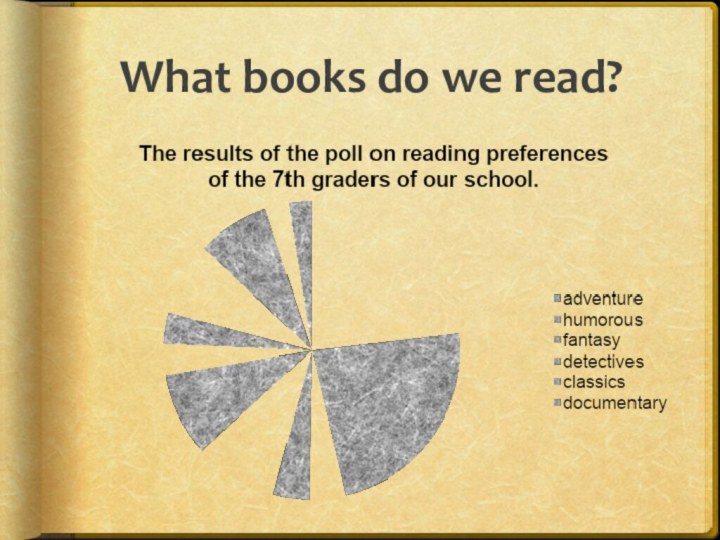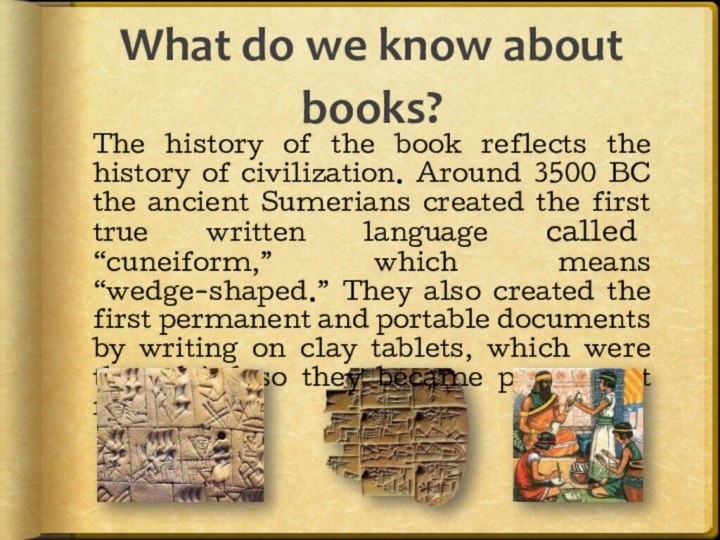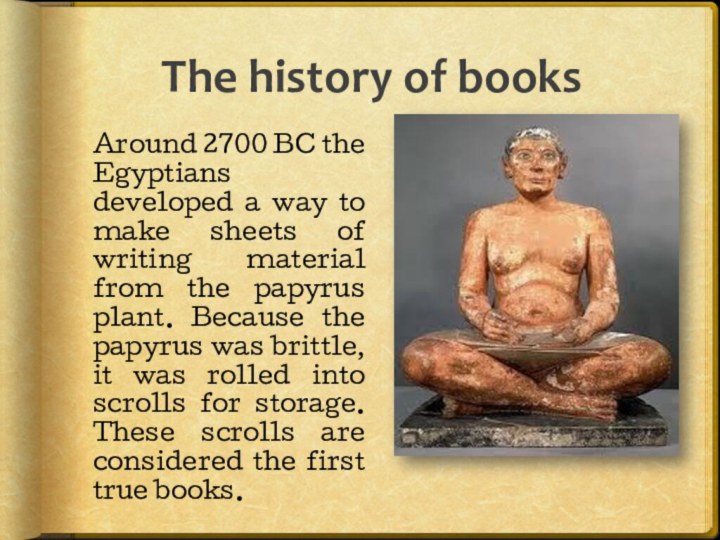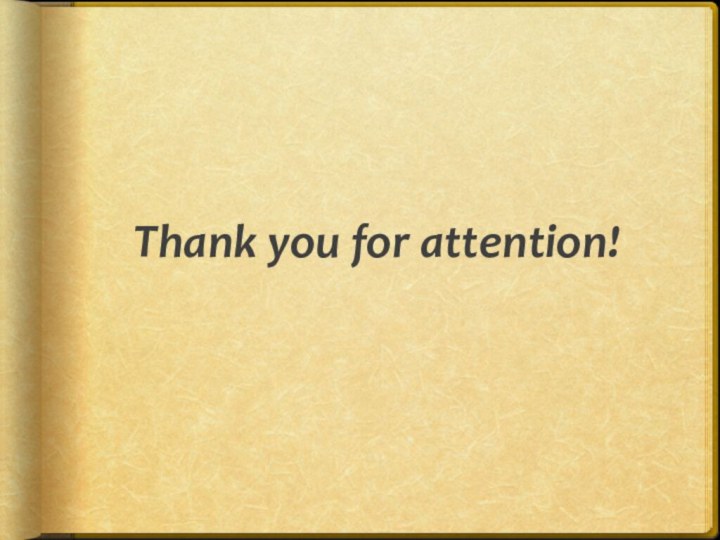Слайд 2
Books in my life
A book, I think, is
very like
A little golden door
That takes me into places
Where
I've never been before.
It leads me into fairyland
Or countries strange and far
And, best of all, the golden door
Always stands ajar.
Слайд 3
Hypothesis: Books play a very important role in
the life of people.
The aim of this project is
to study the role of books in the life of modern teenagers.
Tasks:
to examine the reasons for reading;
to summarize the history of books;
to find out the most popular genres in our school;
to view some hacks how to write a good book.
Methods:
Analyzing special literature; polling classmates.
Слайд 4
Why do we read books?
“When you open a
book, you open a new world”.
Books have been here
for centuries and centuries, without them, today’s human knowledge of our past, ancestors, culture and civilization would have been impossible.
Слайд 5
Why do we read books?
A book is like
a companion, be it a baby’s bedtime story, a
toddler’s picture book, a child’s comic book, a teen’s young fiction or our very own academic books. Books are most often our best pastime, or rather a best friend, the only difference is that the latter will never part or walk away from you.
Of course, we read a lot for our Literature lessons but still we can name some reasons for reading for pleasure.
Слайд 6
Why do we read books?
IT SAVES YOU TIME
It
looks like it’s wasting time, but literature is actually
the ultimate time-saver — because it gives us access to a range of emotions and events that it would take you years, decades, millennia to try to experience directly. Literature is the greatest reality simulator — a machine that puts you through infinitely more situations than you can ever directly witness.
Слайд 7
Why do we read books?
IT MAKES YOU NICER
Literature
performs the basic magic of what things look like
though someone else’s point of view; it allows us to consider the consequences of our actions on others in a way we otherwise wouldn’t; and it shows us examples of kindly, generous, sympathetic people.
Literature deeply stands opposed to the dominant value system — the one that rewards money and power.
Слайд 8
Why do we read books?
IT’S A CURE FOR
LONELINESS
We’re weirder than we like to admit. We often
can’t say what’s really on our minds. But in books we find descriptions of who we genuinely are and what events, described with an honesty quite different from what ordinary conversation allows for. In the best books, it’s as if the writer knows us better than we know ourselves — they find the words to describe the fragile, weird, special experiences of our inner lives…
Слайд 9
Why do we read books?
IT PREPARES YOU FOR
FAILURE
All of our lives, one of our greatest fears
is of failure, of messing up, of becoming, as the tabloids put it, “a loser.” Every day, the media takes us into stories of failure. Interestingly, a lot of literature is also about failure — in one way or another, a great many novels, plays, poems are about people who messed up. Great books don’t judge as harshly or as one-dimensionally as the media.
Слайд 11
What do we know about books?
The history of
the book reflects the history of civilization. Around 3500
BC the ancient Sumerians created the first true written language called “cuneiform,” which means “wedge-shaped.” They also created the first permanent and portable documents by writing on clay tablets, which were then dried so they became permanent records.
Слайд 12
The history of books
Around 2700 BC the Egyptians
developed a way to make sheets of writing material
from the papyrus plant. Because the papyrus was brittle, it was rolled into scrolls for storage. These scrolls are considered the first true books.
Слайд 13
The history of books
The ancient Greek and Romans
often used wax tablets and a stylus for personal
correspondence and business records. These “pages” could be erased by smoothing out the wax.
Слайд 14
The history of books
The Chinese invented paper, which
unlike papyrus, could be easily folded. This led to
the development of the concertina (or accordion) format. The ancient Aztecs also created books using the accordion format.
Слайд 15
The history of books
Around 300 AD, the Romans
began linking together wooden tablets using cords. They called
this a codex, from the Latin caudex, or “tree trunk.” We now use the term codex to refer to any book made of folded and sewn signatures.
Слайд 16
The history of books
During the Middle Ages, books,
especially the Bible, were hand-copied by monks in a
scriptorium. Many of these books contained beautiful miniature paintings called illuminations.
Слайд 17
The history of books
The invention of the printing
press made books cheaper and more popular. More people
could afford to buy them. They read more and thus became better-educated.
Слайд 18
The history of books
The proper system of libraries
appeared in the 19th century. The most important are
in the universities. The biggest library in the world is in Washington, DC. It contains more than 9 million items!
Слайд 19
How to write a book?
Though most of us
like reading books either in paper or digital form,
only a few have tried to write themselves. Those who want to create a book have one serious question: how to make the plot fast-moving and exciting. We have examined several books and here are some helpful hacks how to keep suspense throughout the whole book.
Слайд 20
Useful Hacks to Fuel a Story with Suspense
2.
Point a finger.
Mary Renault’s historical novel “The Persian
Boy” starts with a cataclysm: The death and destruction of the protagonist’s family and home. Before dying, his father screams the name of his betrayer. Well, guess who the Persian boy will meet up with later … much later?
1. Pull a false alarm.
“The Boy Who Cried Wolf” is not only an instructive moral fable, it’s a nail-biter. As soon as you learn of the shepherd boy’s plan to get attention by screaming that a wolf is attacking the sheep, you just know a real wolf is bound to show up sooner or later.
3. Build an oubliette. Medieval lords would sometimes construct a simple pit below the castle floor, into which they would throw any captive they’d prefer to just forget. (Oubliette is French for forgotten place.) No screams could penetrate the heavy lid, and the screams were short-lived in any event. Edgar Allan Poe’s “The Cask of Amontillado” is the example.
Слайд 21
Useful Hacks to Fuel a Story with Suspense
5.
Rip it from the headlines. The daily news is
a terrific place to get ideas for suspense.
4. Water a plant.
Growth can be incredibly suspenseful. Think about it: You plant a seed and you water it. Will it be a stalk of wheat, or a vine of poison ivy? Horror novels from Rosemary’s Baby to The Bad Seed to Carrie and beyond have made use of this simple technique.
7. Withhold the right stuff.
Keeping information from the reader can be a cheap trick, but there’s a right way to do it—by playing fair. In his novella The Valley of Fear, Sir Arthur Conan Doyle keeps the secret of Birdy Edwards’ identity from the other characters and from the reader—but everybody’s given the same information.
6. Fray an end.
Leave a cupboard door open. This visual cue suggests that things are unsettled, not composed, in need of attention.
Слайд 22
Useful Hacks to Fuel a Story with Suspense
10.
Amp the unknown. The unknown is a time-honored suspense
component, especially useful for horror, sci-fi or paranormal. One of the greatest examples of the unknown as a suspense-builder is in Charlotte Brontë’s gothic romance Jane Eyre. There’s something weird going on in that attic! And that drives the suspense all the way to the end.
9. Isolate them. Isolation of a select character or group of characters intensifies the most ordinary circumstances into suspenseful ones. Consider all those closed-room murder mysteries by Agatha Christie, as well as stuck-on-a-boat adventure tales such as Jack London’s The Sea Wolf and Yann Martel’s Life of Pi.
8. Put a symbol into work. Look to nature: Natural processes are inexorable, and they’re understood by all humans instinctively. A beautiful lake can represent the water of life, or it can symbolize something more unsettling if, for instance, your story begins in autumn,
Слайд 23
Conclusion:
The life of modern people is impossible
without books. They reflect our history, teach us, support
in different situations.
Reading is a useful pastime. It broadens the horizons, educate our feelings, develops imagination.
Reading is still up-to-date. It is a sort of communication with someone wise and friendly.
If you have nothing to read, then you can create your own book.
Слайд 24
Used sources:
http://www.writersdigest.com/online-editor/21-fast-hacks-to-fuel-your-story-with-suspense
http://www.booksbuyer.com/article-on-the-importance-of-books/
http://www.brainpickings.org/2014/10/09/school-of-life-literature-reading/
http://www.alleng.ru/engl-top/341.htm
http://en.wikipedia.org/wiki/History_of_books
